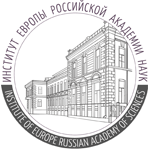Potemkina Olga Yurievna

- Scientific degree: Candidate of Science (History) - 1990, Doctor of Political Science -2013
-
Education: Lomonosov Moscow State University, Faculty of History
-
Position: Head of Department of European integration
-
Scope of scientific interests: European integration, EU migration policy; visa policy; fight against organised crime; EU Russia; EU-Russia relations
-
Major publications:
Selected publications in English
Reform of The Treaty on the European Union: Implement Impossible Abandon//
Herald of the Russian Academy of Sciences. 2022. Т. 92. № S13. С. S1282-S1288.
Countering Transnational Security Threats: Prospects for EU-Russia Cooperation in an Era of Sanctions //Principled Pragmatism in Practice. The EU’s Policy towards Russia after Crimea. F.Bossuyt and P.van Elsuwege, eds. Brill/ Nijhoff, 2021, pp.257-276.
European Union - Eurasian Economic Union: potential for cooperation//«The EU ‒ Russia: the way out or the way down?». O.Potemkina, ed. Moscow, Institute of Europe - Egmont. Royal Institute for International Relations , 2018, pp. 40-46
Russia and the Common Space of Freedom, Security and Justice. Brussels: European Parliament, Directorate General for Internal Policy and Constitutional Affairs, 2013. 38 p. (co-author with Raül Hernández i Sagrera).
EU-Russia Cooperation on the Common Space of Freedom, Security and Justice? A Challenge or an Opportunity? // European Security. 2010. Vol.19. Issue 4, December 2010.
EU and Russia in Search of Strategic Partnership // European Integration without EU Membership: Models, Experiences, Perspectives. Florence: European Union Institute, Max Weber Working Papers, 2009. - P.47-59.
EU-Russia cooperation in Justice and Home Affairs. The EU-Russia Review, N 2, Brussels, November 2006.
A 'Friendly' Schengen Border and Illegal Migration: The Case of the EU and its Direct Neighborhood//”Soft or Hard Borders? Managing the Divide in an Enlarged Europe”, ed. By Joan DeBardeleben ed., Ashgate Publishing Co, 2005.
Russia’s Engagement with the JHA and the Question of Trust. Brussels: CEPS, 2002. 12 p.
Ramifications of Enlargement on the EU-Russia Relations and the Schengen Regime // Justice and Home Affairs in the EU. Liberty and Security Issues after Enlargement, ed. by J.Apap// Edward Elgar Publishing, 2004.
Some Ramifications of Enlargement on the EU-Russia Relations and the Schengen Regime,
“European Journal of Migration and Law”, No. 5, 2003, Kluwer Law International, Netherlands.
EU-Russia Cooperation in Justice and Home Affairs in the Context of Enlargement. Louvaine-la Neuve: Louvaine-la Neuve Université, 2002. 22 p.
(for full list, see the bibliography in Russian)
-
Foreign languages:
- English, French
-
Contacts:
Phone: +7 (495) 692-11-13
Email: This email address is being protected from spambots. You need JavaScript enabled to view it.
